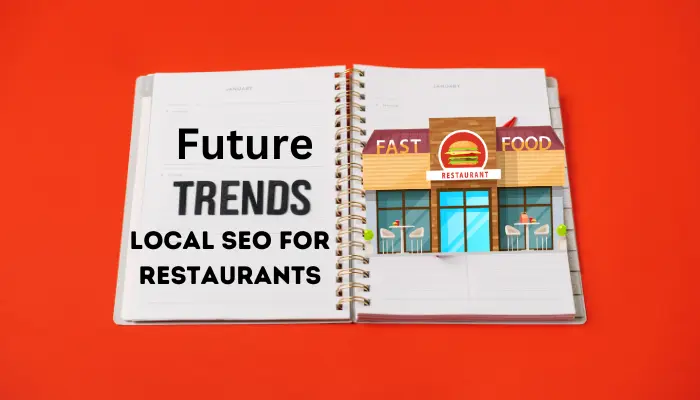Local SEO Services Near Me | Local Pro1 Welcome to...
Hungry for Success: Local SEO For Restaurants
Hungry for Success| Local SEO For Restaurants
In today’s digital age, where the internet is the go-to source for information, the importance of local SEO (Search Engine Optimization) services for restaurants cannot be overstated. Local SEO is a powerful tool that helps restaurants, both large and small, connect with their target audience in their immediate vicinity. It plays a pivotal role in ensuring that hungry customers find their way to your restaurant’s doorstep. Local Pro1will provide you the best local SEO services for restaurants.

SEO Strategy for Restaurants
Creating an effective SEO strategy for restaurants is crucial for attracting local customers and driving more foot traffic to your establishment.
Keyword Research and Analysis:
Primary Keyword: “SEO for Restaurant Websites” is a relevant keyword, but you should also consider targeting keywords specific to your restaurant, such as your cuisine type, location, or unique selling points.
Optimizing Website Content: Ensure your website content includes relevant keywords naturally. Create high-quality, engaging, and informative content, such as blog posts about your menu, food preparation, and customer experiences.
Importance of Mobile Optimization: Optimize your website for mobile devices as many people search for restaurants on their smartphones.
Structured Data Markup: Implement schema markup to provide search engines with structured information about your restaurant, including menu items, hours of operation, and customer reviews. This can enhance your visibility in search results.
Off-Page SEO Tactics:
Building Local Citations: List your restaurant on local business directories like Google Maps, Yelp, TripAdvisor, and Yellow Pages. Ensure that your NAP (Name, Address, Phone Number) information is consistent across all platforms.
Online Reviews and Reputation Management: Encourage clients to post reviews on websites like Facebook, Yelp, and Google. Respond to both positive and negative reviews professionally. Positive reviews can improve your search rankings.
Backlink Building Strategies: Earn high-quality backlinks from reputable local websites and food bloggers. Collaborate with local influencers for reviews and mentions, and create shareable content to attract organic backlinks.
Google My Business (GMB) Optimization:
Claiming and Verifying Your GMB Listing: Claim and verify your Google My Business listing if you haven’t already.
Optimizing GMB Profile: Fill out your GMB profile completely, including your menu, photos, hours of operation, and any special offers or events. Use relevant keywords in your GMB description, and encourage customers to leave reviews.
Local SEO Tools and Resources:
Essential Tools for Restaurant Local SEO:
Google Keyword Planner: For keyword research.
Google Analytics: To monitor website traffic.
Google Search Console: To track your website’s performance in search.
Moz or SEMrush: For competitor analysis and keyword tracking.
BrightLocal or Whitespark: For local citation management.
Helpful Online Resources:
- Follow industry-leading SEO blogs like Moz, Search Engine Land, and Neil Patel’s blog.
- Join local business associations or forums to stay updated on local SEO trends and strategies.
- Consider taking online courses or attending webinars on SEO service to continuously improve your knowledge.
Content Marketing for Local SEO

Blogging for Local SEO:
- Start a blog on your restaurant’s website.
- Create content related to your cuisine, local food culture, and dining experience.
- Incorporate local keywords, such as the city or neighbourhood your restaurant is in.
- Write about upcoming events, local festivals, or news related to your area.
- Share stories about your restaurant’s history, staff, and customers.
Creating Location-Specific Content:
- Develop location-specific landing pages for different areas you serve.
- Include detailed directions, maps, and nearby landmarks on these pages.
- Highlight the uniqueness of your restaurant’s location and its connection to the community.
- Share stories about sourcing ingredients locally and supporting local businesses.
Leveraging Social Media:
Role of Social Media in Local SEO:
- Use social media platforms to engage with the local community.
- Share blog posts, promotions, and news about your restaurant.
- Encourage user-generated content (UGC) through contests and hashtags.
- Utilize location-based tags and check-ins.
- Respond to customer reviews and comments promptly to build trust.
Tips for Effective Social Media Marketing:
- Create visually appealing content, including high-quality photos and videos of your dishes.
- Maintain a consistent posting schedule.
- Collaborate with local influencers or food bloggers for reviews and partnerships.
- Use relevant local hashtags to increase visibility.
- Run targeted ads on social media platforms to reach potential customers in your area.
Video Marketing and Local SEO:
Utilising Video Content for SEO:
- Create short videos showcasing your restaurant, dishes, and behind-the-scenes moments.
- Optimise video titles, descriptions, and tags with local keywords.
- Upload videos to platforms like YouTube and embed them on your website.
- Encourage viewers to visit your restaurant by offering special discounts or promotions in the videos.
Promoting Restaurant Through Video:
- Share customer testimonials and reviews in video format.
- Live-stream events or cooking demonstrations to engage your audience in real-time.
- Use videos to tell the story of your restaurant and its connection to the local community.
- Host video tours of your restaurant, highlighting its ambiance and decor.
- Collaborate with local videographers to create professionally shot content.
User-Generated Content:
Encouraging User Reviews and Engagement:
- Encourage clients to post reviews on websites like Facebook, Yelp, and Google.
- Be professional and kind in your responses to all reviews, positive and negative.
- Give customers who submit reviews incentives like discounts or freebies.
- Use social media to prompt customers to share their experiences using a unique hashtag.
Using User-Generated Content to Boost Local SEO:
- Showcase user-generated photos and reviews on your website.
- Highlight positive testimonials in marketing materials and on social media.
- Share UGC in email newsletters and promotional campaigns.
- Run UGC contests or challenges to encourage customers to create content related to your restaurant.
Common Local SEO Mistakes to Avoid
Neglecting Google My Business (GMB) Optimization:
- Mistake: Failing to claim, verify, or fully optimize your restaurant’s Google My Business listing.
- Solution: Claim and verify your GMB listing, ensure accurate information (name, address, phone number), add high-quality photos, and regularly update your business hours, menu, and special offers.
Ignoring Online Reviews:
- Mistake: Neglecting customer reviews or responding poorly to negative feedback.
- Solution: Encourage satisfied customers to leave positive reviews, promptly address negative reviews professionally, and use feedback to improve your restaurant’s services.
Inconsistent NAP (Name, Address, Phone Number):
- Mistake: Having inconsistent NAP information across different online platforms.
- Solution: Ensure that your restaurant’s NAP details are consistent across your website, GMB, online directories, and social media profiles.
Overlooking On-Page SEO:
- Mistake: Not optimizing your website’s content for local keywords.
- Solution: Include location-based keywords (e.g., “best Italian restaurant in [city]”) in your website’s title tags, meta descriptions, headers, and content.
Neglecting Mobile Optimization:
- Mistake: Failing to make your website mobile-friendly.
- Solution: Ensure your website is responsive and provides an excellent user experience on mobile devices.
Lack of Quality Content:
- Mistake: Not creating valuable and engaging content related to your restaurant and local area.
- Solution: Publish blog posts, articles, and videos that highlight your restaurant’s unique offerings, events, and local attractions.
Disregarding Structured Data Markup:
- Mistake: Not using schema markup to provide search engines with structured information about your restaurant.
- Solution: Implement schema markup for elements like your menu, reviews, and contact information to enhance your search engine visibility.
How to Avoid Common Local SEO Mistakes:
Thoroughly Research Keywords: Conduct keyword research to identify the most relevant and high-traffic keywords for your business. Use tools like Google Keyword Planner or SEMrush to help you find the right keywords to target.
Prioritize Mobile Optimization: With an increasing number of users accessing websites via mobile devices, ensure that your website is mobile-responsive and provides an excellent user experience on smaller screens.
Regularly Update Information: Keep all your online profiles, including GMB, social media, and directories, up to date with accurate business information. This includes your name, address, phone number, business hours, and menu.
Encourage Reviews and Respond: Actively encourage satisfied customers to leave reviews on platforms like Google, Yelp, and TripAdvisor. Always respond professionally and promptly to both positive and negative reviews.
Focus on Quality Content: Create high-quality content that resonates with your target audience. This content can include blog posts, videos, infographics, and more, all relevant to your industry and location.
Utilize Local Link Building: Build relationships with other local businesses and organizations. Collaborate on content, events, or promotions that can lead to backlinks to your website, boosting your local SEO authority.
Monitor Analytics: Regularly review your website’s performance using tools like Google Analytics. Track key metrics such as organic traffic, click-through rates, and conversion rates to understand what’s working and where improvements are needed.
Stay Informed: Keep up with the latest SEO trends and algorithm updates. SEO is an evolving field, and staying informed about industry changes is crucial for success.
Avoid Black Hat Tactics: Steer clear of unethical SEO practices like keyword stuffing, buying links, or using cloaking techniques. Such practices can lead to penalties from search engines.
Seek Professional Help if Needed: If managing your local SEO becomes overwhelming or you’re not seeing the desired results, consider hiring a reputable SEO agency or consultant with experience in local SEO.
Future Trends in Local SEO for Restaurants

Mobile Optimization: With the increasing use of mobile devices, optimising your restaurant’s website and online presence for mobile users is crucial. This includes having a responsive website design, easy navigation, and fast-loading pages.
Local Keywords and Long-Tail Queries: Restaurants need to focus on local keywords and long-tail queries that reflect user intent. This helps in attracting local customers who are searching for specific cuisines, dishes, or dining experiences in a particular area.
Google My Business (GMB) Optimization: Google My Business remains a critical tool for local SEO. Ensure that your GMB profile is complete and accurate with up-to-date information, including business hours, location, menu details, and customer reviews.
Online Reviews and Reputation Management: Customer reviews play a significant role in local SEO. Encourage satisfied customers to leave positive reviews, respond to reviews promptly (both positive and negative), and actively manage your online reputation.
Local Link Building: Building local citations and obtaining quality backlinks from local websites and directories can enhance your restaurant’s visibility in local search results. Collaborate with local businesses, participate in community events, and engage in local partnerships.
Schema Markup: Implementing schema markup on your website helps search engines understand the content better. For restaurants, this can include marking up menu items, prices, and customer reviews, providing more context for search engines.
Voice Search Optimization: With the rise of voice-activated devices, optimizing your content for voice search is becoming increasingly important. Consider how people might verbally search for restaurants in your area and tailor your content accordingly.
Social Media Presence: Social signals, including engagement on platforms like Instagram, Facebook, and Twitter, can indirectly impact local SEO. Maintain an active and engaging social media presence, sharing updates, promotions, and user-generated content.
Video Content: Video marketing is a powerful tool. Create engaging video content showcasing your restaurant, menu items, behind-the-scenes footage, and customer testimonials. Videos can be shared on your website, social media, and video-sharing platforms.
Local Events and Promotions: Hosting or participating in local events and promotions not only attracts customers but also generates local buzz, improving your restaurant’s visibility in local search results.
Conclusion
Implementing local SEO (Search Engine Optimization) is a crucial step for achieving success in the restaurant industry. Local SEO strategies are designed to improve your restaurant’s online visibility within your local community, and when executed effectively, they can have a significant impact on your restaurant’s bottom line. Feel free to contact us for any type of query or the services related to local SEO for restaurants
FAQs
What Is Local Seo For Restaurants?
Local SEO (Search Engine Optimization) for restaurants is a digital marketing strategy focused on optimising a restaurant’s online presence to improve its visibility in local search results. This includes optimising website content, local listings, and online reviews to attract more customers from the local area.
Why Is Local Seo Important For Restaurants?
Local SEO helps restaurants increase their online visibility, making it easier for potential customers to find them when searching for local dining options. Improved visibility can lead to increased foot traffic, reservations, and online orders, ultimately boosting revenue.
How Can I Optimise My Restaurant’s Website For Local Seo?
Optimising your restaurant’s website involves incorporating local keywords, creating location-specific content, optimising meta tags, ensuring mobile-friendliness, and having a clear and accurate NAP (Name, Address, Phone number) on every page.
What Role Do Online Reviews Play In Local Seo For Restaurants?
Online reviews are a significant factor in local search rankings. Positive reviews not only attract more customers but also signal to search engines that your restaurant is reputable. Encourage customers to leave reviews on popular platforms like Google My Business, Yelp, and TripAdvisor.
Is Having A Google My Business (Gmb) Profile Essential For Local Seo?
Yes, having a well-optimised Google My Business profile is crucial for local search success. It ensures accurate business information, provides a platform for customer reviews, and increases the likelihood of appearing in local map packs.
Our Services
Our Latest Posts
PPC White Label Services by Local Pro1 | Expert Solutions
PPC White Label Services by Local Pro1 | Expert Solutions...



